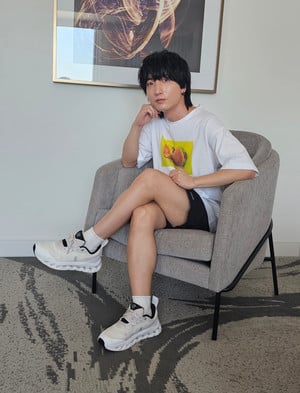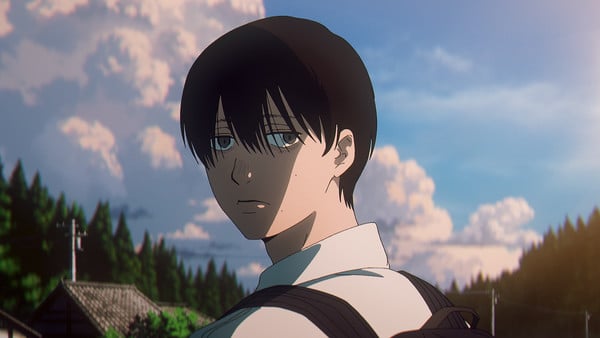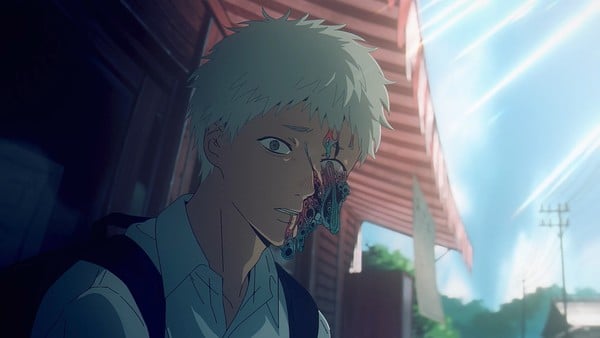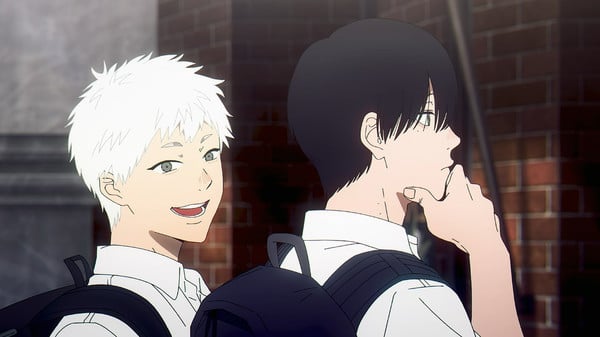How The Summer Hikaru Died Voice Actor Chiaki Kobayashi Learned a Rural Dialect
by Lynzee Loveridge,
The TV anime The Summer Hikaru Died is shaping up to be one of the best anime of the season. The horror series marries small-town life, supernatural occurrences, and the human emotions of grief among the sweltering heat of a Japanese summer. Much of the story's appeal hinges on the central relationship between Yoshiki, a reserved teenager and Hikaru, his long-time friend who is no longer what he appears to be.
We spoke with voice actor Chiaki Kobayashi about his role as Yoshiki, how he became familiar with his character's unique rural dialect used in The Summer Hikaru Died, and his friendship with co-star Shūichirō Umeda.
Congratulations on your role as Yoshiki Tsujinaka in The Summer Hikaru Died. What is it about this story that appealed to you?
Chiaki Kobayashi: So this is a story about someone you're close to becoming a completely different person. We all can relate to that feeling. I think that's very appealing about this story. It made me think, "What if my best friend or my family became a different person just on the inside, something about them just switched to something different. What would I do?" I think it would be very scary.
The story is set in a rural area where the characters speak a different dialect from the Tokyo dialect. Were you already familiar with this way of speaking, or did you practice with a coach? And what were some of the speech differences you had to get used to while voicing Yoshiki?
KOBAYASHI: I'm from Yokohama in Kanagawa Prefecture, so I wasn't familiar with the dialect itself at all. I had a hard time working on it, so I had help from native speakers during the voice recording sessions. Usually, when I receive what's called a rehearsal DVD, it has no audio at all. But mine had had a dialect coach to guide us through the regional speech, and I practiced while watching that.
Additionally, during the recording sessions, the dialect coaches were there to provide feedback on my performance. It was like a double training session.

Could you give an example of a sentence you would say in Tokyo dialect, and then how you might say that in the dialect used in The Summer Hikaru Died, just so our readers can kind of see what the difference might be?
KOBAYASHI: In “The Summer Hikaru Died”, characters speak in the Mie dialect, giving the story a strong sense of place and local flavor. Usually in standard Japanese, like the Tokyo way of speaking, the end of a sentence would be like jan or daiyo ne. But in Mie dialect, it would be yani [with an upward inflection on the last syllable] or yanka.
That's very Interesting.
KOBAYASHI: And also when you speak in standard dialect, tadaima [I'm home] is just tadaima, but in Mie dialect, the distance between those two people and their relationship changes how they say, "I'm home." So if it was someone right next to you, it would be tadaima [low inflection and a short hold on the last syllable]. For people, further away it would be tadaimaaa [longer hold on the final syllable, upward inflection]. The inflection goes up.
The inflection goes up if they're like further away in the house, and—
KOBAYASHI: Also, if they're a close family member or not. That's an interesting aspect of the Mie dialect because it doesn't happen in the standard, Tokyo dialect.
It's just more to consider before you speak. When speaking this dialect, did you have to be more mindful of the character relationships then? Because that might affect how you deliver your lines.
KOBAYASHI: Yes, it was very important. Yoshiki is a somewhat shy person, so it's not easy for him to open up to people quickly. So, because he's a little shy around strangers, or like the mother of his friends, he would become shy and speak in a reserved way. However, when it comes to his close friends or family, he is just an ordinary high school student. That's what I tried to convey. There's a sense of defensiveness towards adults. So, especially when he speaks to adults, he is more closed off.

You're working alongside Shūichirō Umeda-san on the set. What has the experience been like so far working with him? And are there any on-set stories that you can share with us?
KOBAYASHI: Umeda-kun's voice is the soft and bright type. I thought it was perfect for Hikaru's voice. But also the bright side, warm side of his personality. There is also something inhuman about Hikaru. I was really curious about how he would incorporate that non-human aspect into his vocal performance. I couldn't imagine at first how he would do it. As I acted with him, Umeda-kun's voice was bright and warm, yet with an aspect of a monster, something unknown and scary. It makes it even scarier that he sounds warm and bright, but he's actually not. It's something you don't understand.
There's a gap there.
KOBAYASHI: When the recording was finished, I thought how it turned out was very interesting and perfect. As for stories about recording together, during the recording sessions, Umeda-kun eats a lot. Eating a lot makes me sleepy, though, so I try not to overeat. But the image of Umeda-kun and eating a lot, and the Hikaru eating a lot kind of matched together, and I thought it was funny.
I spoke with the director Takeshita-san, and he said that both of you were perfect casts for the series, especially because he noticed after sessions you would walk home together.
KOBAYASHI: That's right. We're also close in age and have similar years of experience as voice actors, too. So we really get along. And because of his very soft and open personality, we really get along and became friends. Often, after recording sessions, we go eat ramen and visit cafes.

That's so nice. Can you walk us through creating Yoshiki's voice in terms of his pitch and cadence? And what parts of his personality were you hoping to convey through the creation of his voice?
KOBAYASHI: Yoshiki, at first glance, seems shy. He's also calm, but he seems a little bit cold or dark. But for me, he was just an ordinary, normal high school student. I didn't want to make him act in a brooding way. So, I focused on making him a little more mature for a high school student. Also, when the speech is delivered quickly, it creates a different personality. It sounds like another Western dialect, not from Mie. Maybe from Osaka or another dialect. So I tried to avoid that by speaking slowly. That's what I paid attention to.
Is there a scene you were most excited to perform or are looking forward to audiences seeing for the first time?
KOBAYASHI: So in episode one, there's a choir scene where all the students are singing together. But it's not in the original work. It's an anime exclusive scene. However, this is a scene that the director Takeshita-san created. It's a pivotal scene, playing a crucial role in the latter part of the story. So even the fans of the original work will be surprised. I want everybody to pay attention to that aspect.
It's a surprise for everyone. Do you have a personal story about interacting with the supernatural?
KOBAYASHI: Nothing supernatural in a horror way. This is not from this anime, but from another recording session. So I had a drink with me, but at one point it was gone, and it moved to another studio, and someone had drunk it. That was scary. So I think humans are scarier than ghosts.
Do you have a message to share with your fans in the United States?
KOBAYASHI: I am participating in this interview in Los Angeles, and the LA summer feels different from the Japanese summer. So I am enjoying that difference.
It's not quite as humid.
KOBAYASHI: I think the American audience can feel the humidity in Japan while watching episodes of The Summer Hikaru Died. Even if they have never been to Japan, they can experience the Japanese summer through it. In that intriguing setting, Hikaru and Yoshiki's rich drama unfolds. So I hope they look forward to enjoying it.
The Summer Hikaru Died manga series is available in English from publisher Yen Press. The anime series is currently airing on Netflix.
Disclosure: Kadokawa World Entertainment (KWE), a wholly owned subsidiary of Kadokawa Corporation, is the majority owner of Anime News Network, LLC. One or more of the companies mentioned in this article are part of the Kadokawa Group of Companies.
discuss this in the forum (7 posts) |